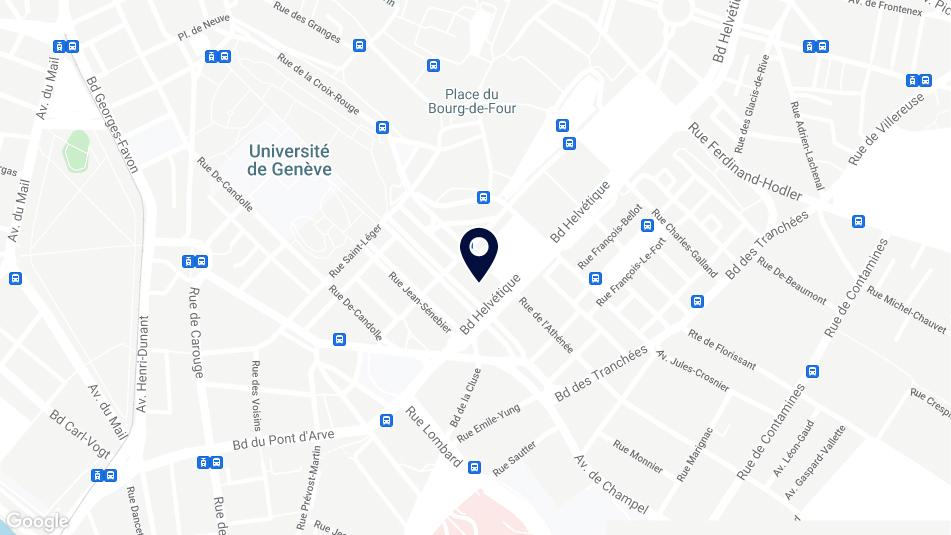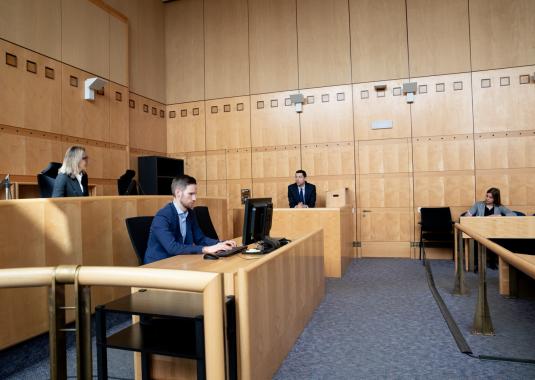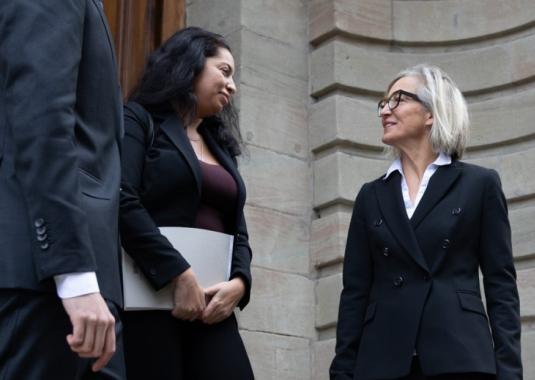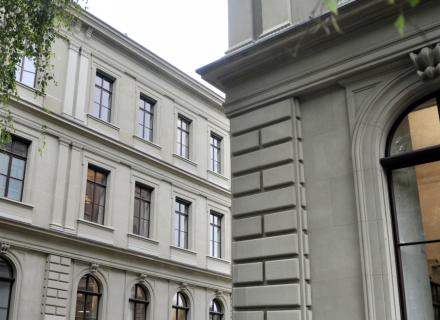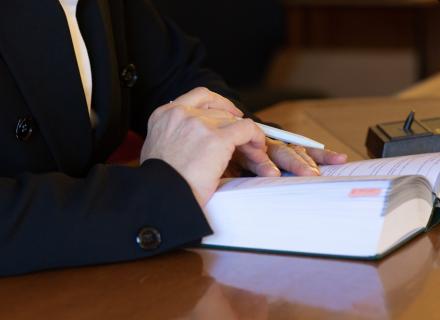Contacts
Address
Contact details
Desk
Opening hours
9h-12h / 13h30-16h00
Filing applications of ex-parte interim measures and seizures to the Tribunal de première instance
Urgent requests must be submitted no later than the closure of the desk at 4:00 pm.
In the event of filing with the greffe universel of the Judiciary power, urgent applications will generally be processed in the 24 hours following payment of the fee and therefore, in principle, the following day, particularly for documents filed in the afternoon.
Mailing address
Tribunal de première instance
Case postale 3736
1211 Genève 3
Presidency and Directorate
Mr. Pierre-Yves MAURON
President
Mrs. Joëlle COTTIER
Vice-President
Mr. Guillaume MEIER
Director
Competences
The Tribunal de première instance acts in particular as the authority of:
- Conciliation for civil cases, excluding those assigned to another authority by law (Tribunal des prud'hommes, Tribunal des baux et loyers)
- First instance judgment (with the exception of disputes falling within the jurisdiction of the Tribunal des prud'hommes, the Tribunal des baux et loyers or the Tribunal de protection de l'adulte et de l'enfant)
- Judgments enforcement (art. 86 para. 2 let. c LOJ)
It rules in particular in the following areas:
- Family law: separation, divorce, action to declare a parent-child relationship, division of the marital property, parents' obligations towards their children, etc.
- Law of persons: rectification of marital status, gender reassignment
- Law of contracts: sale contract, agency contract (bank, doctor, architect, etc.), work contract
- Company law and trade law: cancellation of the general meetings' decisions, declaration that a document is void
- Succession law: annulment of testamentary provisions, questions relating to statutory entitlements, estate division, various conflicts between heirs, disclaimer of inheritance, etc.
- Interim measures: e.g. a building contractors' lien, protection of legal personality
- Recovery: clearance to proceed following debt collection procceedings, seizure
- Bankruptcy
Organization
The Tribunal de première instance is composed of 26 career judges (professional judges). They work closely with jurists and with a clerk for the administrative follow-up of the proceedings and the recording of minutes in court hearings.
The Tribunal de première instance Office can be reached by telephone during the indicated opening hours for questions relating to a pending proceeding. It does not provide legal advice.
Proceeding
The proceedings before the court involve several steps:
Step 1: bring an action before the court
You must write your application in French and send it to the Tribunal de première instance by post or by handing it directly at the desk of the court or at the Greffe universel.
Your request should indicate against whom it is directed, what you wish to obtain (your conclusions) and state as clearly as possible the grounds on which it is based. The request must be dated and signed.
Step 2: make an advance payment on costs
Before continuing the examination of your application, the court requires you to make an advance payment on costs, the amount of which depends on the nature and purpose of your request, pursuant to the applicable rules of order (RTFMC - E 1 05.10 or OELP - RS 281.35).
Initially, i.e. in disputes subject to the prior conciliation procedure, the amount of this advance varies between Fr. 100.- and Fr. 240.-.
For family law cases, the amount already depends at this stage on the nature and purpose of your conclusions pursuant to the applicable rules of order.
Step 3: conduct of the proceedings
In principle, the court proceedings are preceded by a conciliation procedure.
There are, however, exceptions, provided for in articles 198 and 199 CrimPC (e.g. divorce, summary proceedings, interim measures, action for release from a debt).
Depending on the nature of the cases:
- Either you and your opponent are summoned to a preliminary conciliation hearing. In this case, the judge will try to get the parties to reach an agreement. If an agreement is reached, the procedure is concluded with a conciliation record which is equivalent to a judgment.
- However, if the conciliation attempt fails, this step comes to an end:
- By granting an authorisation to proceed on the basis of which the proceedings can continue before another judge
- By a proposal for judgment addressed by the judge to the parties when the amount in dispute does not exceed Fr. 5'000.-
- By a decision, if the disputed value does not exceed Fr. 2'000.-
- Either you and your opponent are summoned directly to a hearing.
- Or an exchange of written submissions is carried out beforehand to enable the opponent to comment in writing about your request.
The number and type of hearings depend on the nature of your case.
Step 4: end of the procedure
You are informed that your case is ready for trial.
At the end of the procedure, the judge will issue his/her judgment which will be notified to you in writing within a few weeks (8 weeks on average).
Application forms
Delivery of certificates
For cases filed starting from January 1, 2011
This form concerns requests for deeds (free copies, certified copies, extracts of judgments, attestations of enforceability, certificates of entry into force, Annexe V of the Lugano Convention, various attestations and certificates) relating to proceedings initiated on or after January 1, 2011.
For cases filed before January 1, 2011
This form concerns requests for deeds (free copies, certified copies, extracts of judgments, enforceable copies, certificates of entry into force, various attestations and certificates) relating to proceedings initiated before January 1, 2011.
Recording of a statutory mortgage right (tradesmen and building contractors)
For tradesmen and building contractors who want to protect their debt by recording a statutory mortgage right on their client's property.
Banishment
For the owner of a private property, who wishes to prohibit access to this property, or to prohibit an existing or imminent disturbance, or to be able to affix official signs to denounce the offenders.
Debt collection proceeding / removal of objections
Sequestration order
Request for removal
To obtain the provisional or final removal of the objections filed by the debtor against the order to pay.
Proceeding
Application for conciliation
To initiate proceedings in civil and commercial matters before the conciliation authority.
Main exceptions (art. 198 CPC): (Ex-parte) interim measures, measures for the protection of the marital union, divorce, dissolution of a registered partnership, rectification of the civil status registry, some proceedings arising from the DEBA (action for release from a debt, action for a declaratory judgment, third party action, action for participation, action to challenge the schedule of claims, action to ascertain new assets, action for the recovery of items).
Simplified statement of claim
For financial disputes with a value in dispute not exceeding 30’000.- francs and for other cases specifically provided for in the law (disputes involving violence, threats, or harassment (art. 28b CC), certain disputes concerning leases and rents, disputes relating to the right of access to data under the Federal Act on Data Protection).
Request in the clear case proceeding
Where the facts are not in dispute or can be very easily established, and the application of the law is not complicated.
Exclusion divorce, proceedings involving children in family law.
Separation and divorce
Divorce by joint request
To ask for a divorce, on the basis of an agreement between the two spouses.
The spouses can submit a total agreement (on all points) or partial (some points remain contentious and will be decided by the judge) to the court.
Request for precautionary measures during divorce proceedings
To request the urgent intervention of the judge during the divorce proceedings.
Request for measures for the protection of the marital union
To request the intervention of the judge when no divorce proceedings have been initiated (for example, to determine maintenance contributions, custody and visitation rights over the children, the allocation of the house to one of the spouses, etc.).
Questions/answers
If your resources are insufficient to defend your interests in court, you may, under certain conditions, be eligible for legal aid. This financial aid is not free of charge.
It consists mainly of partial or total payment of lawyers' fees and legal costs for people who do not have the necessary means to pay them. You will have to reimburse it as soon as you are able to do so.
For more information, consult the thematic guide Legal aid
You can bring a case to the Tribunal de première instance of Geneva if you or/and your spouse are domiciled in Geneva.
Yes, in the following cases:
- At the stage of conciliation
- At any stage of the proceedings, if the hearing is public
As a general rule, you are required to appear in person at a hearing, including family law hearings where the court has specifically ordered it and at conciliation hearings.
If you are represented by a lawyer, he/she will advise you whether your presence at the hearing is required.
Note: the presence of minor children who have not been summoned (even babies) is not allowed at the hearing (unless exceptionally agreed by the judge).
Hearings are open to the public, except in the following cases:
- Family law matters (divorce, marital protection, support, parental rights, paternity, etc.)
- Conciliation hearings
- When the court has ordered the hearing to be held in camera because of a particular private or public interest
